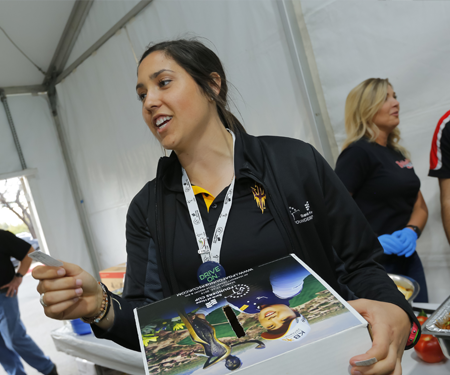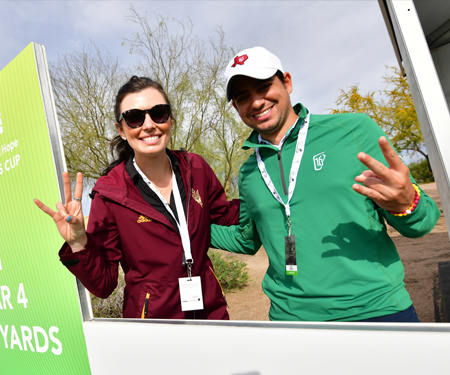Students in ASU Law sports program get hands-on experience helping run LPGA event

Students in the ASU Law sports program at LPGA event. Photo by Scott Wood
The Phoenix metro area provides a home field advantage to the Sandra Day O’Connor College of Law at Arizona State University and its innovative Master of Sports Law and Business program. Home to everything from Super Bowls and Final Fours to spring training and NASCAR races, the region is a veritable sports mecca — a learning environment like no other for those aspiring to work in the sports industry.
Among the numerous marquee events is the Bank of Hope Founders Cup, the LPGA Tour’s annual tournament in Phoenix since 2011. The most recent Founders Cup, held in March, brought in more than 65,000 spectators — and also doubled as a training lab for 25 students in the Sports Big Events class who helped plan, promote and operate the tournament.
Professor Stephanie Jarvis, who teaches the class, says she and MSLB Director Glenn Wong were looking for an event that could provide real-world experience for the students.
“We thought a tour event would be good so that students could make connections that could help with their career, in addition to gaining major event experience,” Jarvis said. “The timing of the LPGA event worked well with the class.”
The class teaches all elements of running a major event. In addition to their work with the tournament, students hear from guest speakers and have assignments related to bidding, setting up a 501(c)(3), creating an organizational chart, marketing, ticketing and other essential tasks.
Scott Wood, director of The Founders Cup, said it takes an army to run a golf tournament, so the students were a welcome addition.
“I had tried this model with other schools in the past and didn’t have much success with it, so I was little bit hesitant at first,” he said. “But one of the things I learned early on was this was going to be a unique set of students. They were ready to get out and conquer the world, coming out of a master’s program. It was an unbelievable experience, and all our expectations were met.”
One of the students, Margaret Stahm, said meetings began as far back as November, so that once the semester began in January, they were able to hit the ground running.
Stahm, a softball standout who played for ASU as an undergrad, said she had always steered clear of golf to protect the mechanics of her swing.

Margaret Stahm during the rush of the tour event that the students worked on for a semester. Photo by Scott Wood
“So I knew absolutely nothing about golf,” she said. “But I got bit by the bug the second I showed up. I just loved the people, the experience, being on the golf course. And the staff were incredible. They truly trusted us and gave us important things to do. Every day you showed up, there was something new to do.”
Fellow student Reed Goodhue said his responsibilities evolved throughout the project, from inventory work and organizing gifts to setting up ropes and railings on the course and meeting with sponsors and LPGA executives.
“I would call my role sort of a utility role,” he said. “If they needed something picked up, something set up, somebody escorted somewhere — whatever was necessary at the time, I was willing to do it.”
Likewise for Stahm. She got the one assignment she was not quite prepared for while she was working in the tournament’s office on the pro-am day.
“They said, ‘You need to go caddy,’” she recalls laughingly. “I said ‘I can’t caddy — I don’t know the first thing about golf!’ They said, ‘We’ll give you a crash course, but you’ve got to get in this cart and get to the first tee box, because we’re short a caddy.’ So I said, ‘I guess I’m doing this,’ and I got to caddy for 18 holes. And it turned out to be an amazing experience.”
Wood said that’s simply the predictably unpredictable nature of operating a major sporting event.
“You might wake up and have a list of five to 10 things you think you’re going to get done, and your day might be blown up by 7:15 in the morning and you have to put out fires and do a hundred other things,” he said. “That’s one of the things we told the students: When you run an event, you don’t have a singular job. You wear many hats.”
Goodhue welcomed the variety of assignments and said he and the other students were treated as equal members of the staff.
“What made it such a great experience was the willingness of Scott and the LPGA team to allow us to fully participate and take on some important tasks,” he said. “I didn’t feel like an intern. I felt like an employee who was part of the team and contributing in a meaningful way.”
The tournament’s attendance climbed 5% from the previous year, and Wood said the students were instrumental in that success, bringing innovative marketing and promotional ideas to the table.
“They just started putting together fun activities and new ideas that we hadn’t thought about or didn’t have time to think about,” Wood said. “They took it and ran with it and executed it flawlessly. We had some late nights, and we were trying to get the students to go home, but they were really invested in this. It was very impressive.”
Jarvis said it’s a win-win partnership, providing the LPGA with high-level support staff, while students gain invaluable experience and build connections within the industry.

Students from the MSLB program. Photo by Scott Wood.
“They now have practical, real-world experience to put on their resumes, and they also made valuable relationships with both the local and national LPGA staff,” she said. “This will help them as they begin their career searches. They would be able to take this experience and look for jobs at any LPGA Tour stop, or, really, any other event.”
Stahm, in fact, will be interning at LPGA headquarters in Daytona Beach, Florida, this summer. She said she never would have imagined working in the golf industry, which shows the value of the opportunities provided by the MSLB program.
“I didn’t know what I was going to do after graduation, and now I have a path and a plan, and it’s all because I took this class and said yes to working this tournament.”
Wood said he and Stahm will be speaking to a group of tournament operators this summer about the partnership between ASU Law and the Founders Cup.
“Many within the LPGA saw how successful it was, so we’ll be making a presentation to help drive this in other markets,” Wood said. “We think this is going to be the gold standard for these types of programs going forward.”
More Law, journalism and politics
Can elections results be counted quickly yet reliably?
Election results that are released as quickly as the public demands but are reliable enough to earn wide acceptance may not…
Spring break trip to Hawaiʻi provides insight into Indigenous law
A group of Arizona State University law students spent a week in Hawaiʻi for spring break. And while they did take in some of the…

LA journalists and officials gather to connect and salute fire coverage
Recognition of Los Angeles-area media coverage of the region’s January wildfires was the primary message as hundreds gathered at…

